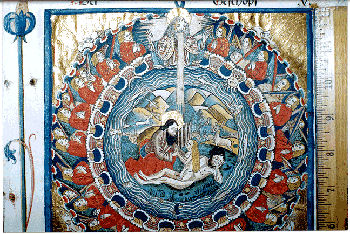From Our Archives
Dan Clendenin, Questions Not Answered: "Follow Me" (2011); Debie Thomas, God in the Dock (2014); and Debie Thomas, Words Are Not Enough (2020).
For Sunday October 1, 2023
Lectionary Readings (Revised Common Lectionary, Year A)
Exodus 17:1–7 or Ezekiel 18:1–4, 25–32
Psalm 78:1–4, 12 –16 or Psalm 25:1–9
Philippians 2:1–13
Matthew 21:23–32
This Week's Essay
If you came to my house, you wouldn't find much of any monetary or aesthetic value — save one minor exception. A long time ago, my brother-in-law gave us two pages from old Bibles that we had framed. They now hang right inside our front door.
One page is Acts 24 from a 1549 Matthew Bible, originally translated by William Tyndale, Myles Coverdale, and John Rogers. For his efforts, Tyndale was strangled to death and his body burned. Rogers was similarly "tested by fire." The other page is Jeremiah 3 from a German Bible published by Anton Koberger in 1483.
For 1500 years, the Bible was available only to scholars who could read Hebrew, Greek or Latin. Its interpretation was strictly controlled by the church. But then, during a remarkable ten-week stretch when he was hiding in a castle in Wartburg, Germany, Martin Luther translated the Greek New Testament into vernacular German — the dialect of ordinary people.
The initial edition of 3,000 copies that appeared in September 1522 included twenty-one woodcuts by Lucas Cranach. It sold for half a gulden, about a week's pay for a skilled carpenter. It quickly sold out. It would be 1534 when the complete Bible with both testaments was published. When Luther died in 1546, there were 350 editions of his Bible. "He had become, by far, the most published writer in the world," says one scholar. He had also radically altered western history.
 |
|
Anton Koberger Bible, 1483.
|
There were, in fact, fourteen editions of the complete Bible translated into German before Luther's famous translation, and my Koberger page comes from one of them, published in 1483 — the year that Luther was born, and just twenty-seven years after the Gutenberg Bible of 1456 that is widely considered the first book printed in Europe. And so those framed pages remind me of my Protestant heritage. They are material artifacts of the radical ferment of that time and place.
A few weeks from now, on October 31, Protestants will celebrate Reformation Day, commemorating the day that Luther nailed his Ninety-Five Theses to the door of the Castle Church in Wittenberg, thus kick-starting the Reformation. For an excellent book on the subject, I recommend the volume by Diarmaid MacCulloch, The Reformation (2003), and my own essay Two Cheers for the Reformation.
Another marvelous book brings me to the readings for this week. It's by the historian Martin Marty and called October 31, 1517: Martin Luther and the Day That Changed the World. How was it, he asks, that a young monk, at a new university, in an obscure little town, touched such a nerve as to convulse all of Europe and, eventually, the whole world?
It's right there in Luther's Thesis #1, says Marty: "When our Lord and master Jesus Christ said 'Repent,' he intended the entire life of believers to be repentance."
In the gospel of Mark, the very first words spoken by Jesus call us to repentance: "Repent and believe, for the kingdom of God is at hand." This was the "focal point" of all Ninety-Five Theses, says Marty, even an "obsession" with Luther — "the biblical claim that one is 'made right with God' not through any human effort — the code word then and now was and is 'through good works' — but entirely by divine grace 'through faith.'"
Luther's bold idea, writes Marty, touched "the human heart at its deepest font."
"Repent and live!" begs Ezekiel in the reading for this week (18:32). In a culture that has forgotten how to blush, and that counsels us to "never apologize and never explain," his words sound archaic and dour. That repentance is a lifelong task that encompasses our entire life is the last thing that even Christians want to hear.
But for those of us who want to live Christianly, repentance is central to life rather than peripheral. It's essential rather than optional. And contrary to modern misconceptions, when done well, repentance is entirely life-giving rather than death-dealing. Repentance is a movement toward wholeness rather than a descent into self-hatred.
Repentance best takes place in a church community, but it's ultimately a personal act rather than a religious ritual. Luther insisted on this point as he tried to recover the explosive power of the gospel that he believed had been encrusted with 1500 years of arbitrary church authority and tendentious traditions.
 |
|
Anton Koberger Bible, 1483.
|
Luther was attacking the medieval sacramental system of "penance," and especially the buying and selling of indulgences, which was a sort of bribe paid to the church that purported to reduce one's penalty for sin.
Appealing to the original Greek New Testament, Luther insisted that Jesus did not prescribe a complicated ritual that required the believer to confess to a priest, purchase an indulgence, or repeat so many Hail Marys, as suggested by Jerome's Latin translation of the Bible in the fifth century that held sway in the Western church for a full 1,000 years (poenitentiam agite, "do penance").
Rather, in a way unmediated by rules, regulations, and formulas, we simply and radically "repent" before God himself (Greek, metanoia). We change our minds and turn in a different direction. In the words of the famous Apple ad campaign, in repentance we "think different."
In this sense, repentance can be quite simple, as observed by the Syrian abbot John Climacus (c. 525–605) in his The Ladder of Divine Ascent: "Let your prayer be very simple. For the tax collector and the prodigal son just one word was enough to reconcile them to God."
A single word can be sufficient, but genuine repentance is also a life-long style of life, which is to say that it's also a complex process that acknowledges our fallen human condition — disordered loves, distracted thoughts, unruly desires, unbidden dreams, and all the many things I don't understand about myself. Since we will never know perfection this side of heaven, there will never be a time when we don't need repentance as our friend. With Luther, we can say that repentance requires our entire life, throughout our life, if we hope to make changes for the good.
In the gospel this week, Jesus offended his listeners when he observed that decidedly immoral people like prostitutes and tax-collectors understood repentance better than religiously righteous people. The religiously righteous wrongly believe that they are better than they really are; they imagine that they don't need to repent. Moral outcasts have no such illusions, nor the need to hew to social conventions that protect us; they know how bad off they are.
 |
|
Anton Koberger Bible, 1483.
|
I learned this lesson the hard way when a therapist once informed me that my test scores indicated that I scored way high on the built-in "fudge factor" that smokes out answer patterns that are too good to be true. "No," said the therapist, "you are not as good as your answers insinuate, nor will this test let you fake it. In fact, your fudge factor is way beyond the standard deviation."
Jesus further observed that children are often better at admitting their faults and failures than adults. They have no filters. My wife had a second-grader in her class who once drew a picture of a fierce rhinoceros with a disturbing and unvarnished admission as a caption: "I'm as angry as a rhino!"
In her book Amazing Grace; A Vocabulary of Faith, Kathleen Norris writes about a little boy who wrote a poem called "The Monster Who Was Sorry." In the poem the boy explodes about how he hated it when his father yelled at him. In anger he threw his sister down the stairs, wrecked his room, then destroyed an entire town. His poem concludes: "Then I sit in my messy house and say to myself, 'I shouldn't have done all that.'"
Commenting on the boy's poem, Norris writes, "'My messy house' says it all; with more honesty than most adults could have mustered, the boy made a metaphor for himself that admitted the depth of his rage and also gave him a way out. If that boy had been a novice in a fourth century monastic desert, his elders might have told him that he was well on the way toward repentance, not such a monster after all, but only human. If the house is messy, they might have said, why not clean it up, why not make it into a place where God might wish to dwell."
For further reflection:
* Psalm 25 for this week: "Remember, O Lord, your great mercy and love, for they are from of old. Remember not the sins of my youth and my rebellious ways; according to your love remember me, for you are good, O Lord… For the sake of your name, O Lord, forgive my iniquity, though it is great."
* A favorite prayer from Arsenios (5th century): "My God, do not abandon me. I have done nothing good before Thee, but grant me, in Thy compassion, the power to make a start."
Weekly Prayer
Chaim Stern
Prayer for Overcoming Indifference
For the sin of silence,
For the sin of indifference,
For the secret complicity of the neutral,
For the closing of borders,
For the washing of hands,
For the crime of indifference,
For the sin of silence,
For the closing of borders.
For all that was done,
For all that was not done,
Let there be no forgetfulness before the Throne of
Glory;
Let there be remembrance within the human heart;
And let there at last be forgiveness
When your children, O God,
Are free and at peace.From Chaim Stern, editor, Gates of Repentance (Central Conference of American Rabbis, 1978).
Dan Clendenin: dan@journeywithjesus.net
Image credits: (1) Wikipedia.org; (2) Maryland State Archives, USA.; and (3) Princeton University Art Museum.





